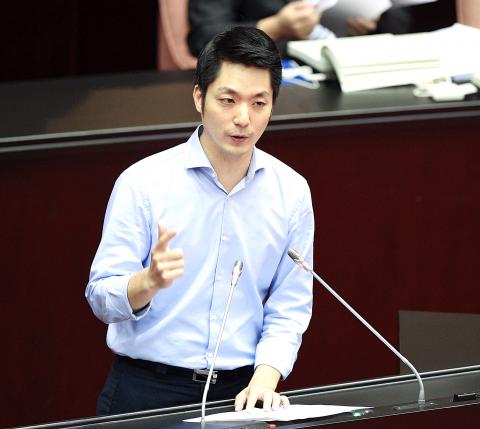Chinese Nationalist Party (KMT) Legislator Chiang Wan-an (蔣萬安) yesterday reaffirmed his opposition to China’s “one country, two systems” formula after his previous support for President Tsai Ing-wen’s (蔡英文) “four musts” drew ire from pan-blue supporters.
Chiang, grandson of former president Chiang Ching-kuo (蔣經國), first expressed opposition to the “one country, two systems” formula during a political talk show on Thursday last week, in which he also expressed support for Tsai’s “four musts” as a basis for cross-strait relations.
Tsai in her New Year’s Day speech on Tuesday last week said that China must recognize the existence of the Republic of China (ROC); respect the values of democracy and freedom that Taiwan’s 23 million residents hold dear; resolve cross-strait differences in a peaceful and equitable manner; and engage in negotiations with the government or an institution with a mandate from the government.

Photo: George Tsorng, Taipei Times
Chiang Wan-an’s support for Tsai’s position on cross-strait ties drew criticism from KMT supporters, with many attacking him on Facebook and some calling him a “separatist.”
A KMT member praising Tsai’s speech “is classic inexperience and naivety,” former KMT Central Policy Committee director Alex Tsai (蔡正元) said.
“When did Tsai Ing-wen and the Democratic Progressive Party (DPP) ever acknowledge the existence of the ROC? Does [Beijing] require the abolition of freedom and democratic systems [as part of unification]?” he asked.
The so-called “1992 consensus” is a peaceful way for Taiwan to achieve parity with China, Alex Tsai said.
The “1992 consensus,” a term former Mainland Affairs Council chairman Su Chi (蘇起) in 2006 admitted making up in 2000, refers to a tacit understanding between the KMT and the Chinese Communist Party that both sides of the Taiwan Strait acknowledge there is “one China,” with each side having its own interpretation of what “China” means.
Chiang Wan-an yesterday said that he supports the KMT’s definition of the “1992 consensus” that both sides of the Strait must be free to define “China” in their own way.
That freedom forms the basis of the “1992 consensus,” which is built on the foundation of the ROC Constitution and is executed through the Act Governing Relations Between the People of the Taiwan Area and the Mainland Area (台灣地區與大陸地區人民關係條例), he said.
While he does not agree with Tsai Ing-wen’s refusal to acknowledge the “1992 consensus,” he could not accept the “one country, two systems” formula, Chiang said.
“Taiwan is not Hong Kong,” he said, adding that most Taiwanese would not accept unification under the formula.
Whoever is president needs to follow the nation’s Constitution and protect its sovereignty, he said.
He added that regardless of who is president, they must acknowledge the existence of the ROC, protect democracy and the freedom of its citizens, and must resolve differences with China in a way that recognizes the equal legitimacy of the ROC and its institutions.
“If President Tsai refuses to accept the ‘1992 consensus’ and refuses to acknowledge its existence, I implore her to provide a specific solution for discourse with China, and not just throw around hipster slogans,” Chiang Wan-an said.

Weather conditions across Taiwan are expected to remain stable today, but cloudy to rainy skies are expected from tomorrow onward due to increasing moisture in the atmosphere, according to the Central Weather Administration (CWA). Daytime highs today are expected to hit 25-27°C in western Taiwan and 22-24°C in the eastern counties of Yilan, Hualien, and Taitung, data on the CWA website indicated. After sunset, temperatures could drop to 16-17°C in most parts of Taiwan. For tomorrow, precipitation is likely in northern Taiwan as a cloud system moves in from China. Daytime temperatures are expected to hover around 25°C, the CWA said. Starting Monday, areas

A Taiwanese software developer has created a generative artificial intelligence (AI) model to help people use AI without exposing sensitive data, project head Huang Chung-hsiao (黃崇校) said yesterday. Huang, a 55-year-old coder leading a US-based team, said that concerns over data privacy and security in popular generative AIs such as ChatGPT and DeepSeek motivated him to develop a personal AI assistant named “Mei.” One of the biggest security flaws with cloud-based algorithms is that users are required to hand over personal information to access the service, giving developers the opportunity to mine user data, he said. For this reason, many government agencies and

The National Fire Agency on Thursday said a series of drills simulating a magnitude 8.5 earthquake would be held in September to enhance the government’s emergency response capabilities. Since earthquakes cannot be predicted, only by continuously promoting disaster prevention measures could Taiwan enhance its resilience to earthquakes, agency Director-General Hsiao Huan-chang (蕭煥章) said in a news release. The exercises would be held to mark annual National Disaster Prevention Day on Sept. 21, the aim of which is to test Taiwan’s preparedness and improve its earthquake resilience in case of a major temblor, Hsiao said. As part of those drills, an earthquake alert would

STRICTER ENFORCEMENT: Taipei authorities warned against drunk cycling after a sharp rise in riding under the influence, urging greater public awareness of its illegality Taipei authorities have issued a public warning urging people not to ride bicycles after consuming alcohol, following a sharp rise in riding under the influence (DUI) cases involving bicycles. Five hundred and seven people were charged with DUI last year while riding YouBikes, personal bicycles, or other self-propelled two-wheelers — a fourfold increase from the previous year, data released by the Taipei Police Department’s Traffic Division showed. Of these, 33 cases were considered severe enough to be prosecuted under “offenses against public safety,” the data showed. Under the Road Traffic Management and Penalty Act (道路交通管理處罰條例), bicycles — including YouBikes and other